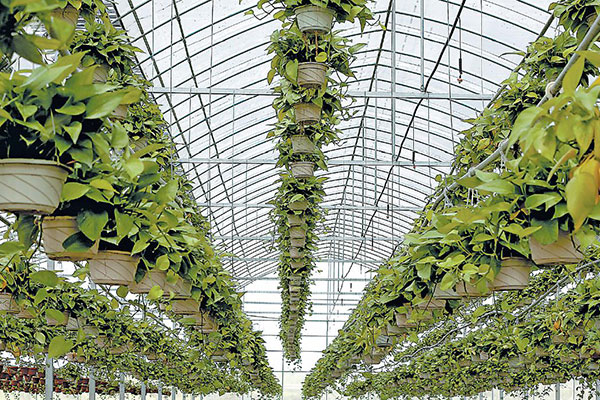Seeds of success planted online
By MENG JING (China Daily) Updated: 2015-08-11 08:37
 |
|
Popular household pot plants in China are raised in Qiao Xuebao's greenhouses in Suqian, Jiangsu province.[MENG JING/China Daily] |
Alibaba built 1,803 village-level Taobao Rural Service Stations in 17 provinces last year-part of a 10 billion yuan investment plan over the next five years. And JD.com has been encouraging employees, who are from rural areas, to go back to their hometowns to set up delivery businesses.
"We hope each village in China can have a born-and-bred farmer, who can work as a catalyst to educate the entire village about e-commerce," Zhang Yong, chief executive officer of Alibaba, said in Zhejiang province last month.
Apart from tech-related issues, farmers also need specialist advice on what fertilizers to buy and knowledge about crop diseases. Ma, from Linyi city, taps into his father's vast agricultural experience to come up with answers to problems.
"Farmers usually send me photos of their products and let me give a diagnosis for their plants," he said.
Ni Liang, senior director of Taobao, expects e-commerce to boost incomes for farmers and improve the entire logistics chain. "From buying seeds and farming equipment online to improving agricultural knowledge, e-commerce will play a major role," he said. "Ultimately, this will help sell more high quality products online and boost incomes in the farming sector."
Big data will also be crucial. This is a broad term for processing vast amounts of complex statistics, which can be boiled down into market and consumer trends.
In the agricultural industry, oversupply can force farmers to sell their crops at knockdown prices. Hopefully, that will change in the future.
"With more farmers buying and selling online, we can eventually gather enough data to predict the supply and demand situation through big data technology," Ni said. "That is the ultimate goal."
But analysts believe there is still a long way to go before the online farming industry can be sustainable as well as financially successful.
Wang Xiaoxing, an analyst with Beijing-based Internet consultancy Analysys International, said that quality control needs to be tightened up.
"Unlike consumers products, if you find fake goods, customers can return them, but farmers who buy fake fertilizer or fake seeds can rarely spot the problem until it is too late," he added.
Ma Si contributed to this story.
- 2015 China International Fair for Investment and Trade kicks off in Xiamen
- China's commodity imports robust in Jan-Aug period
- China stocks rebound 2.92%
- 2015 China box office already past 2014 total
- China foreign trade decline widens in August
- Interview: JP Morgan's senior executive bullish on China
- Innovation, development the focus for NZ mayors
- Lives of freelancers

















